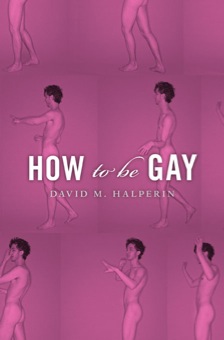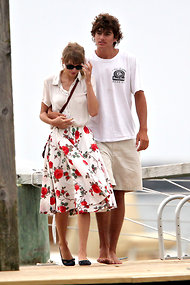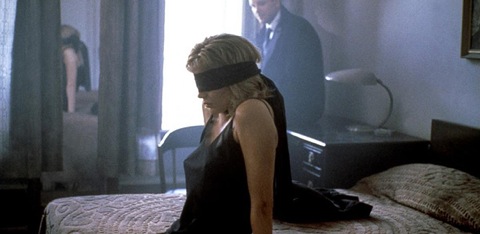How to Be Gay
A key quote:
In other words, Gideonse explains, "gayness is a kind of subjectivity: not just a political and social identity, but also a way of being, seeing, and doing."

Full story
Romance = Heedlessness?

Heedlessly Romantic
By HENRY ALFORD
Published: September 21, 2012
YOUNG love burns bright. But fast moves drop jaws. Consider the perturbations of Taylor Swift this summer.
Just weeks after the 22-year-old singer was first spotted with her 18-year-old boyfriend, Conor Kennedy — a student at Deerfield Academy in Massachusetts and a son of Robert F. Kennedy Jr. — Ms. Swift looked at houses for sale near the Kennedy compound in Hyannis Port, Mass. (Some publications reported that she plunked down $4.9 million for one across the street from Mr. Kennedy’s grandmother Ethel Kennedy.)
Then came the news that the two lovebirds crashed a Kennedy wedding at the Fairmont Copley Plaza in Boston. When Victoria Kennedy, the bride’s mother, saw Ms. Swift at the ceremony, she introduced herself and, lest the singer upstage Ms. Kennedy’s daughter, asked her politely to leave.
“It was like talking to a ghost,” Ms. Kennedy told The Boston Herald. “She seemed to look right past me.”
When the objects of our affections act in a manner that seems overeager or even presumptuous (or when we ourselves act that way), bells start to ring. Are these the pealing bells of a Swiss mountaintop village that’s perpetually awash in a goldenly caramel light, or are these the ominous tollings of a hunchback pulling a rope?
The actions of courtship are particularly difficult to parse when viewed through the prism of etiquette. What strikes one person as lovely (“You bought my mother flowers!”) strikes another as pushy (“You bought my mother flowers?”). Undoubtedly, a thoughtful, optimism-fueled gesture can, in the right context, make the heart throb, as if to signal the recent ingestion of much heavy cream.
[Article here.]
Morning After Photos
Morning-after photos: The latest sexy wedding trend
After you've documented the cake-cutting, the first kiss, and the bouquet toss, how about memorializing your first night of married passion?
POSTED ON AUGUST 27, 2012, AT 9:27 AM

Prenuptial boudoir photos are so... two weeks ago — the new hot trend in wedding photography, according to the New York Daily News, is "sexy" photos taken of the happy couple on the morning after their wedding night. For these morning-after photo shoots, the wedding photographer comes into the pair's home, honeymoon suite, or wherever they spent their first night together as a married couple to capture the rumpled, unmade bed, and the bride and groom in various stages of intimacy and undress. Not everyone in the wedding industry thinks these post-consummation photos are necessary, or even tasteful — the trend is "a little bizarre," Candy Cantor of New York City's RK Bridal tells the Daily News. "I am far from a prude," but "there's a sexiness to the wedding and I think that's enough." But plenty of couples disagree. Here's a look at this new way of documenting your love:
Article here.
What Makes "50 Shades" Popular
Attention '50 Shades' Copycats: Rip Off the Orgasms, Not the Whips and Chains
By MAURA KELLY
This week's Diary of a Submissive tries to cash in on the year's big publishing craze. But it misunderstands what made the original so popular.

The key paragraph for us:
Now, sure: Anastasia is so into Christian that she gives some mildly kinky stuff a try, and finds she even enjoys some of it. All the same, she also agrees with him when he remarks that she doesn't have a submissive bone in her body. This novel isn't a fantasy of submission. It's a fantasy about finding a rich, handsome guy who's obsessively in love with you—and knows how to make you come.
Full article here
"Their Eyes Were Watching God" at 75
Professor Lisa Woolfork--Department of English
Professor Gertrude Fraser--Vice Provost for Faulty Recruitment and Retention
Professor Victor Cabas--Department of Rhetoric, Hampden-Sydney College
Professor Sabrina Pendergrass--Department of Sociology/ African American and African Studies
Kwame Holmes--Carter G. Woodson Institute, Post-Doctoral Fellow
Jason Saunders--Department of English Doctoral Student
Tuesday, September 18, 2012
4:30pm
125 Minor Hall
Light refreshments to follow in Minor Hall Lobby
Economics, Romance, and Gender Roles

…
As the usual path to the middle class disappears, what’s emerging in its place is a nascent middle-class matriarchy, in which women like Patsy pay the mortgage and the cable bills while the men try to find their place.
…
[Full article here]
A Domestic Contract
From a January 26, 1947, contract between Kurt Vonnegut and his pregnant wife, Jane, to whom he had been married for sixteen months. Kurt Vonnegut: Letters, edited by Dan Wakefield, will be published next month by Delacorte Press.
I, Kurt Vonnegut, Jr., that is, do hereby swear that I will be faithful to the commitments hereunder listed:
I. With the agreement that my wife will not nag, heckle, or otherwise disturb me on the subject, I promise to scrub the bathroom and kitchen floors once a week, on a day and hour of my own choosing. Not only that, but I will do a good and thorough job, and by that she means that I will get under the bathtub, behind the toilet, under the sink, under the icebox, into the corners; and I will pick up and put in some other location whatever movable objects happen to be on said floors at the time so as to get under them too, and not just around them. Furthermore, while I am undertaking these tasks I will refrain from indulging in such remarks as “Shit,” “Goddamn sonofabitch,” and similar vulgarities, as such language is nerve-wracking to have around the house when nothing more drastic is taking place than the facing of Necessity. If I do not live up to this agreement, my wife is to feel free to nag, heckle, and otherwise disturb me until I am driven to scrub the floors anyway—no matter how busy I am.
[Full article here]
The Myth of Ownership: An Anthropologist Looks at the Corporate Share
Associate Professor of Anthropology
University of Virginia
August 31, 2012
Brooks Hall 2nd Floor Conference Room
1:00 P.M.-3:00 P.M.
Reception to follow in Brooks Hall Commons
Given the scale of attention paid to the stock market and the importance of stock investment in the economy, it is surprising how much mystification attaches to the question of what corporate stock is. The predominant view is that companies are owned collectively by the owners of the shares of their stock, and this principle forms the foundation of norms of corporate purpose that are widely taken for granted. But there is in fact no strong legal case for this view, and the evidence from the economicstructure of corporations is drawn solely from early stage firms and is contradicted in the case of the later stage public companies whose shares are traded on the main stock exchanges.
In this talk I explain the significance of our society's "mythic" construction of corporate share ownership. Its academic support comes from finance economics and reflects flawed, individualistic presuppositions regarding property ownership and the nature of corporate entities. An anthropological perspective, attuned to the specifics of social form and the historicity and reality of social formations, is needed to demystify the nature of corporate equity as a form of property, and to reveal the essentially political construction of its role in contemporary capitalism.
Online Dating Reading

Lee suggests this book as a possibility --
The chapter I was thinking of earlier about race and online relationships (not exactly dating) is titled "Fucking with Fucking Online: Advocating for Indiscriminate Promiscuity" by Michael J. Faris and ML Sugie, in Why are Faggots so Afraid of Faggots: Flaming Challenges to Masculinity, Objectification, and the Desire to Conform (Matilda Bernstein Sycamore, ed). Its only 7 pages or so long. A lot of the other chapters might work well as optional reading, as well. I really liked another chapter called "Trans/Nationally Femme: Notes on Neoliberal Economic Regimes, Security States, and my Life as a Brown Immigrant Fag" by Debanuj DasGupta. Other chapters might be hit or miss.

